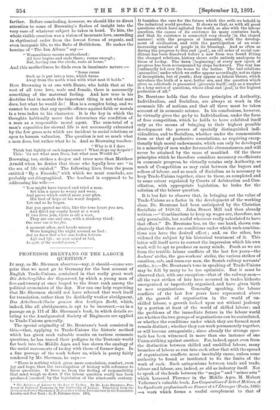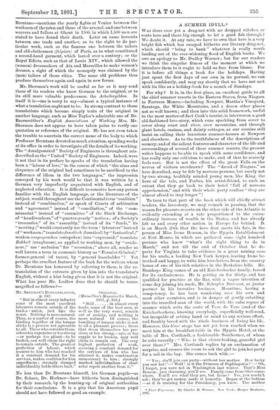PROFESSOR BRENTANO ON THE LABOUR QUESTION.* IT may, as Mr.
Sherman observes—nay, it should—cause sur- prise that we must go to Germany for the best account of English Trade-Unions, contained in that really great work
Die Arbeitergilden der Gegenwart, by which a young man of eve-and-twenty at once leaped to the front rank among the political economists of the day. Nor can one help regretting that Mr. Sherman should not have selected that work itself for translation, rather than its decidedly weaker abridgment, Das Arbeitsverhdltniss gentiles dein heutigen Becht, which, indeed, like all abridgments, is apt to be incorrect,—as in a passage on p. 111 of Mr. Sherman's book, in which details re-
lating to the Amalgamated Society of Engineers are applied to Trade-Unions generally.
The special originality of Dr. Brentano's book consisted in this,—that, applying to Trade-Unions the historic method which has given such valuable results on various economic
questions, he has traced their pedigree in the Teutonic world far back into the Middle Ages, and has shown the analogy of the social movements of to-day with those of former days. In a fine passage of the work before us, which is pretty fairly rendered by Mr. Sherman, he says :— " There is nothing which gives more consolation, comfort, even joy and hope, than the investigation of history with reference to these questions. It frees us from the feeling of responsibility that must weigh us down if the labour question really has been produced [created] by the legislation of the nineteenth century.
• The Relation of Labour to the Low of To-Day. By Dr. Lnjo Brentano, Pro- fessor of Political Economy in the University of Leipsic. Translated from the German by Porter Sherman, A.M.,together with an Introdaction by the Translator. London and New York : G. P. Putnams Sons. 1892.
It banishes the care for the future which the evils we behold in the industrial world produce. It shows us that, as with all great questions which have agitated the world, so also with the labour question, the causes of its existence lie many centuries back, and that its existence is connected very closely [in the closest manner] with the progress of humanity, with the develop- ment of civilisation, and with the participation of an ever- increasing number of people in its blessings. And as often as during the progress to this end [goal], an old order of social con- ditions has been dissolved before a new form was found fitting the changed relations, history shows evils entirely analogous to those of to-day. The dawn [beginning] of every new epoch of progress has been accompanied by steps backward. The way has continually led over the worse to the better. The bad relations [anomalies] under which we suffer appear accordingly, not as signs of decrepitude, but of youth; they appear as labour throes, which introduce the birth of a new, better era, and the question which gives us solicitude is presented [presents itself] only as a number in a long series of questions, whose ideal end [goal] is the highest perfection of all."
Dr. Brentano holds that the three principles of Authority,
Individualism, and Socialism, are always at work in the economic life of nations, and that all three must be taken account of in economic science. In his conclusions, however, he virtually gives the go-by to Individualism, under the form of free competition, which he holds to have exhibited itself only as the means of bringing to their highest possible
development the powers of specially distinguished indi- vidualities, and to Socialism, whether under the communistic form or that of productive associations, as requiring excep-
tionally high moral endowments, which can only be developed in a minority of men under favourable circumstances, and will never be attained by the mass of mankind. Of the three principles which he therefore considers necessary co-efficients in economic progress, he virtually retains only Authority, so much of Competition as may exist between the buyers and sellers of labour, and so much of Socialism as is necessary to keep Trade-Unions together, since to these, as completed and to some extent regulated by Courts of Arbitration and Con- ciliation, with appropriate legislation, he looks for the solution of the labour question.
It is but fair to observe that, in bringing out the value of Trade-Unions as a factor in the development of the working
class, Dr. Brentano had been anticipated by the Christian
Socialists of 1848-52. John Stuart Mill had then already written :—" Combinations to keep up wages are, therefore, not only permissible, but useful wherever really calculated to have that effect." Dr. Brentano has, on the one hand, shown con- clusively that there are conditions under which such combina-. tions can have the desired effect ; and, on the other, has widened the subject by his historical treatment of it. This
latter will itself serve to correct the impression which his own work will be apt to produce on many minds. Fresh as we are from the terrible labour conflicts of the last few years—the dockers' strike, the gas-workers' strike, the various strikes of omnibus, cab, and tram-car men, the Scotch railway servants'
strike, &c.—Dr. Brentano's tone in speaking of Trade-Unions may be felt by many to be too optimistic. But it must be observed that, with one exception—that of the railway-men-
all the vast strikes of late have occurred in trades hitherto unorganised or imperfectly organised, and have given birth
to new organisations. Generally speaking, the labour conflicts of the last few years have represented above all the growth of organisation in the world of un- skilled labour, a growth looked upon not without jealousy by a portion at least of the world of skilled labour ; and
the problems of the immediate future in the labour world are whether the two groups of organisations can be assimilated, or whether the conditions under which they are formed must remain distinct ; whether they can work permanently together,
or will become antagonistic ; since already the strange spec- tacle has been witnessed in more than one instance of one Union striking against another. For, indeed, apart even from the distinction between skilled and unskilled labour, many branches of labour so run into each other that with the spread of organisation conflicts must inevitably ensue, unless some authority be found or instituted to fix the limits of the work of each. Such antagonisms between trade and trade, labour and labour, are, indeed, as old as industry itself. Not to speak of the feuds between the " major " and " minor arts "
which harassed Florence in the Middle Ages, M. Hubert Valleroux's valuable book, Les Corporations d'Arts et Metiers, et les Syndicate professionals en France et a VEtranger (Paris, 1885) —a work which forms a useful complement to that of Brentano—mentions the yearly fights at Venice between the workmen of the town and those of the arsenal, and one between weavers and fullers at Ghent in 1500, in which 1,500 men are stated to have found their death. Later on came lawsuits between one trade and another, as to the right to do par- ticular work, such as the famous one between the tailors and old-clothesmen (fripiers) of Paris, as to what constituted a second-hand garment, which lasted over a century ; or the Royal Edicts, such as that of Louis XIV., which allowed the (women) dressmakers of Aix and Marseilles to make women's dresses, a right of which the monopoly was claimed by the (men) tailors of those cities. The same old problems thus produce themselves again and again in new forms.
Mr. Sherman's work will be useful so far as it may send those of its readers who know German to the original, or to its still more valuable predecessor, the Arbeitergilden. In itself it is—one is sorry to say—almost a typical instance of what a translation ought not to be. In strong contrast to those translations which become simply texts of the original in another language, such as Miss Taylor's admirable one of Dr. Baernreither's English Associations of Working Men, Mr. Sherman does not appear to have taken pains to verify one quotation or reference of the original. He has not even taken the trouble to ascertain the correct name of the body to which Professor Brentano devoted so much attention, spending weeks at its office in order to investigate all the details of its working. The "Amalgamated" Society of Engineers is throughout mis- described as the " United " Society of Engineers. Indeed, were it not that in its preface he speaks of the translation having been a "labour of love," in the course of which "the aims and eloquence of the original had sometimes to be sacrificed to the difference of idiom in the two languages," the impression conveyed by his work would be that it was written by a German very imperfectly acquainted with English, and of neglected education. It is difficult to conceive how any person familiar with the English language, or the literature of the subject, would throughout use the Continental term "coalition" instead of "combination," or speak of Courts of arbitration and " agreement" instead of " conciliation," of the " com- missariat" instead of "committee" of the Stock Exchange, of " handiworkers," of " quarter-yearly " notices ; of a Society's "treasuries," of its "assembly," instead of its " funds," its "meeting ;" would constantly use the term labourers" instead of " workmen ;" t ran slatefanatisch (fanatical) by " fantastical ;" weaken ausgesprochen (outspoken) into " expressed;" translate Rohheit (roughness), as applied to working men, by "crude- ness ;" use seclusion" for " secession ;" above all, render so well known a term in economic history as " Fermier-General," farmer-general (of taxes), by " general leaseholder " ! Yet perhaps the cruellest feature of the book for the writers whom Dr. Brentano has honoured by referring to them, is the re- translation of the extracts given by him into the translator's English, without a hint being given that it is not the original. What has poor Mr. Ludlow done that he should be trans- mogrified as follows F— ORIGINAL.
(Macmillan's Magazine for March,
1861, p. 363.) " Still in almost every trade, some of the best men, as well as the very worst, remain out of society, and nothing is more natural. Of course, the bundling of human sticks is not to all a pleasant process ; those that deem themselves too pre- cious or too strong,—aye, or too supple to be broken, may well claim to remain out. The very highest perfection of work, securing a constant demand for the services of him who has attained it, makes combination unnecessary to him ; strongly marked individualism of char- acter repels another from it."
No less than Dr. Brentano himself, his German pupils—as Dr. Scharz, Dr. Herkner—have hitherto been distinguished by their research, by the hunting-up of original authorities for their conclusions. It is a pity that his American pupil should not have followed so good an example.
:KR. SHERMAN'S RETRANSLATION, p. 142.
"But in almost every industry some of the most excellent labourers remain outside of the trades - union, just like the worst.. Nothing is more natural. Thus, as a matter of course, the binding together of the human sticks is a process not agreeable to all. Those who consider them- selves too expensive or too strong —or perhaps too pliant—to be broken, can well claim the right to remain outside. The greatest perfection of labour, which secures to him who has reached it a constant demand for his services, makes coalition for him superfluous ; strongly stamped individuality holds others back."



































 Previous page
Previous page